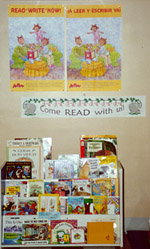Reading program approaches anniversary
by Chris WestPublic Relations
Reach Out and Read-Charleston is nearly a year old. Not only has it aged, it has grown.
Marie Lobo, Ph.D., Kelly Havig-Lipke, M.D., and Laura Dobbins, MSN, have watched their fledgling children’s reading program grow into a well-supported and effective learning tool that prepares children for their upcoming years in school.
 Books
are displayed for the children's reading program.
Books
are displayed for the children's reading program.
The program received approval in February 1999 and was implemented in October. The program is a collaboration among the MUSC College of Nursing, College of Medicine, Department of Pediatrics, Volunteer Services and Children’s Hospital Department of Child Life. Trident Literacy Association and the Trident United Way also support the program.
“We have received lots of outside help in response to the program,” said Lobo. “The Trident United Way awarded us a grant of $21,000 to fund a program coordinator’s salary. The Community Foundation and the Blackbaud Employees Fund have made donations along with a host of other local institutions such as Ashley Hall School, Mason Preparatory School and St. John’s Cathedral. Many personal donations have been made and the Department of Pediatrics and the MUSC library have also hosted book drives for us this past year.”
Program representatives recently made presentations to the Rotary and Kiwanis Clubs and is eager to address other community groups that may be interested in participating.
Nationally, a presentation was made to the Fifth International Family Nursing Research Conference in Chicago this past July.
The program is designed to introduce reading early in a child's life to promote and reinforce literacy that will be beneficial to their early years of education as well as their overall wellbeing.
“Beginning at birth, children will receive a book on every well childcare visit until they are 5 years old,” Dobbins said. “This differs from the national program in that they begin at 6 months of age. We begin at birth because that’s where intellectual learning begins and it also equals three more books than the national program.”
When the program began, the participating clinics on campus were the Primary Pediatric Clinic and the Nurse Midwifery in the Pediatric Center. “This has spread to include the Primary Pediatric Clinic at Charleston Memorial Hospital and even as far as the St. James Santee Family Health Center in McClellanville. The Family Medicine Clinic at MUSC will also be participating,” Lipke said.
The initial goal of the program was to serve 2,500 children and distribute 6,000 books a year. Since its implementation, it has given more than 4,000 books to children in the program at MUSC.
“Nationally, the program has seen the same results as our program here thanks to partnerships with Pfizer Pharmaceuticals and Scholastic Books,” Lipke said. “The participating hospitals and clinics across the country have grown to more than 700 and have served more than a million children.”
Research on the effects of the program has only addressed the short-term outcomes and has been shown that participation increases both expressive and receptive language, which is linked to later school readiness. Also, families that participate in the program are more likely to have child-centered literacy orientation in the home. One example of this is reading to a child at bedtime on a regular basis.
“A proposal for research into the long-term effects is in the works, and we believe it will reinforce the short-term findings,” Lobo said.
The subject matter of the books distributed is matched to the appropriate age and reading level of the children. Various subjects are addressed including books on counting, the alphabet, nursery rhymes, animals and bedtime stories.
“Even some nationally popular books have been reprinted in board book format that are more durable and better suited to children of young ages,” Lobo said. “Reach Out and Read, nationally, has had books printed in various languages and some have even been translated so that they may be read visually and through Braille,” Lipke said.
One of the driving forces of reinforcing reading to patients is the volunteer staff that reads to children as they wait to be seen by clinicians. “This has good and bad news associated with it in that where it’s valuable to the children, the waiting times in our pediatric clinics are so short that volunteers have little time to read to children,” Lobo said. “We only hope this leaves an impression on the children and they ask to be read to outside of clinic visits.”
The program also includes parent involvement by supplying the books, but also by writing a parent “prescription” as a reminder to read to their children. Bookmarks and posters with reading tips are also distributed as encouragement to both children and parents.
“As far as next year’s goals, we want to acquire sustained funding for the coordinator position and to extend the program funds to include elementary students. We also hope to expand the program and its message to other public clinics and private practices in the area with high numbers of children not ready for school,” Lobo said.
Donations to the program can be made at any of the participating clinics. Questions regarding volunteering should be directed to Susanne Banks at 792-7038.
For more information about the Reach Out and Read program call 792-7041.